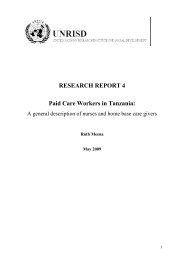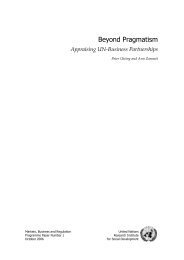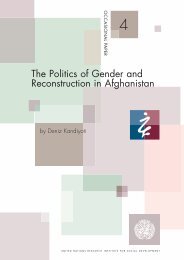Women's Employment - United Nations Research Institute for Social ...
Women's Employment - United Nations Research Institute for Social ...
Women's Employment - United Nations Research Institute for Social ...
You also want an ePaper? Increase the reach of your titles
YUMPU automatically turns print PDFs into web optimized ePapers that Google loves.
Women’s employment in the textile manufacturing sectors of Bangladesh and Morocco<br />
For most of the factory heads, training on the job is fundamental<br />
and should be done inside the factory. The apprenticeship period is<br />
thus also a period of “discipline”. The young woman learns to follow<br />
the rules and regulations of the factory and, having learnt the craft,<br />
she becomes indebted to the firm. Apprenticeship and on-the-job<br />
training are also ways of delaying the moment when the employees<br />
have to be given the statutory minimum wage. This is seen by factory<br />
heads as being a probationary period which gives the firm an<br />
opportunity to select their employees at the same time as having them<br />
work <strong>for</strong> low wages. Even if a girl has a dress-making diploma, she is<br />
paid Dh 600 a month <strong>for</strong> a period that lasts from six months to two<br />
years.<br />
According to some factory heads, in any one group of women<br />
workers recruited, half of them are dismissed after six months of<br />
training because they have not given satisfaction and have not adapted<br />
to the working conditions. By using probation as part of this selection<br />
procedure, the firms save money on wages. At the same time, this<br />
system means that the qualifications and diplomas obtained in the<br />
schools and training centres are devalued. The main reason given by<br />
factory heads is that the knowledge that comes with a diploma does<br />
not correspond to the needs of the firm. Experience is valued more<br />
highly than qualifications and is used as the basis of promotion.<br />
This emphasis on experience rather than qualifications puts the<br />
factory head at an advantage in selecting workers and fixing their<br />
wages. Factory heads thereby gain the flexibility they need to organize<br />
the development of the women workers and to decide the level of<br />
skill (experience) they have acquired, as well as their wage level. It<br />
should be noted as well that the qualification given by a diploma can<br />
lead to collective bargaining to link qualifications to salary levels,<br />
whereas the criterion of experience and the capacity or incapacity of<br />
the worker to learn quickly results, at best, in individual bargaining<br />
where the factory head and his supervisors have the power to evaluate<br />
the experience of the women workers.<br />
The low education levels and poor on-the-job training methods<br />
mean that the training period <strong>for</strong> women workers in the garment and<br />
knitwear sectors goes on <strong>for</strong> some time. During this period, their work<br />
is not officially recognized as it is not remunerated at the<br />
minimum wage level. Some factory heads take advantage of the low<br />
wages during the training period and try to prolong it <strong>for</strong> as long as<br />
possible.<br />
Although the factory heads complain about the lack of education,<br />
in practice they seem to choose employees who have education but<br />
76
















